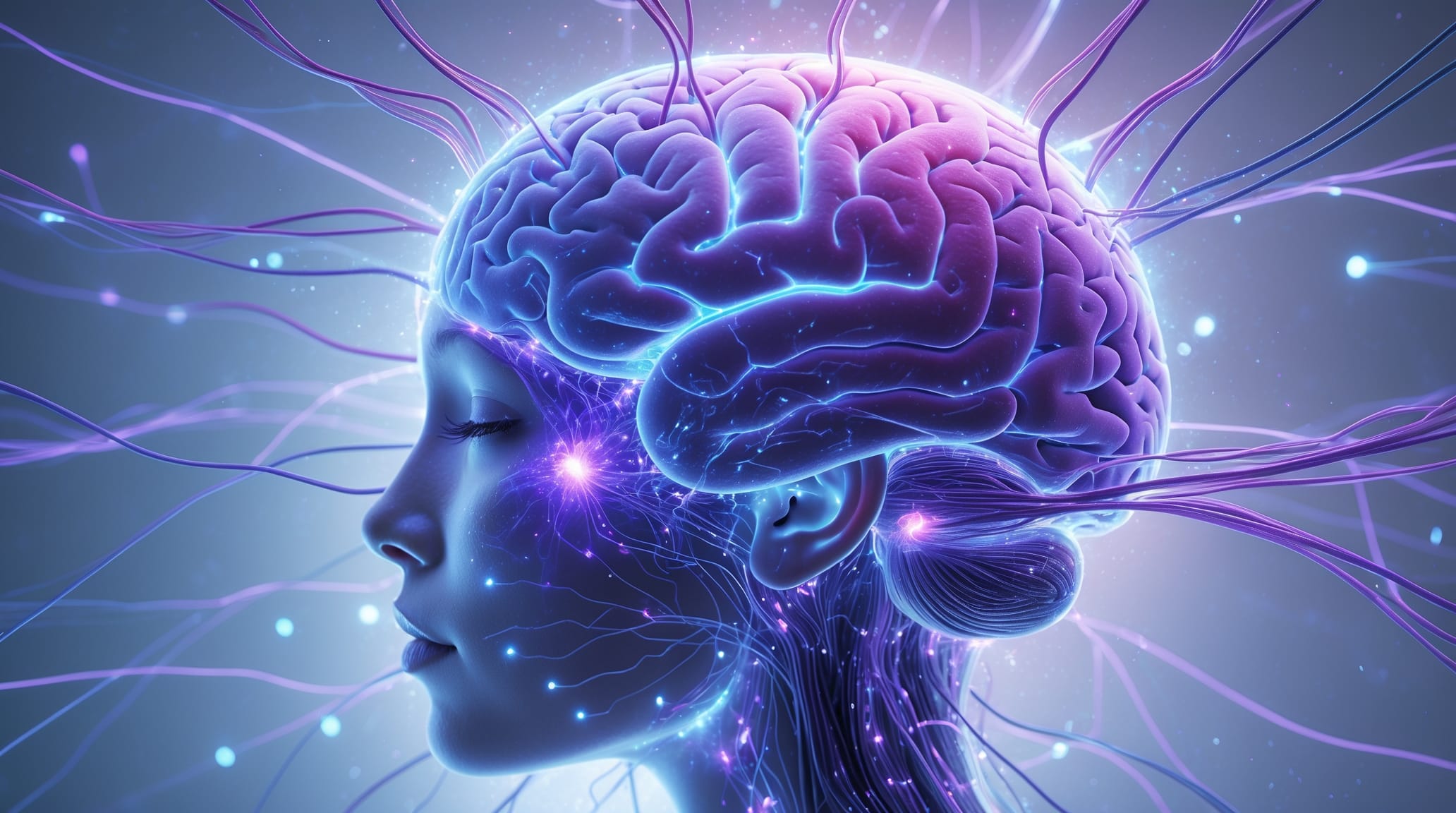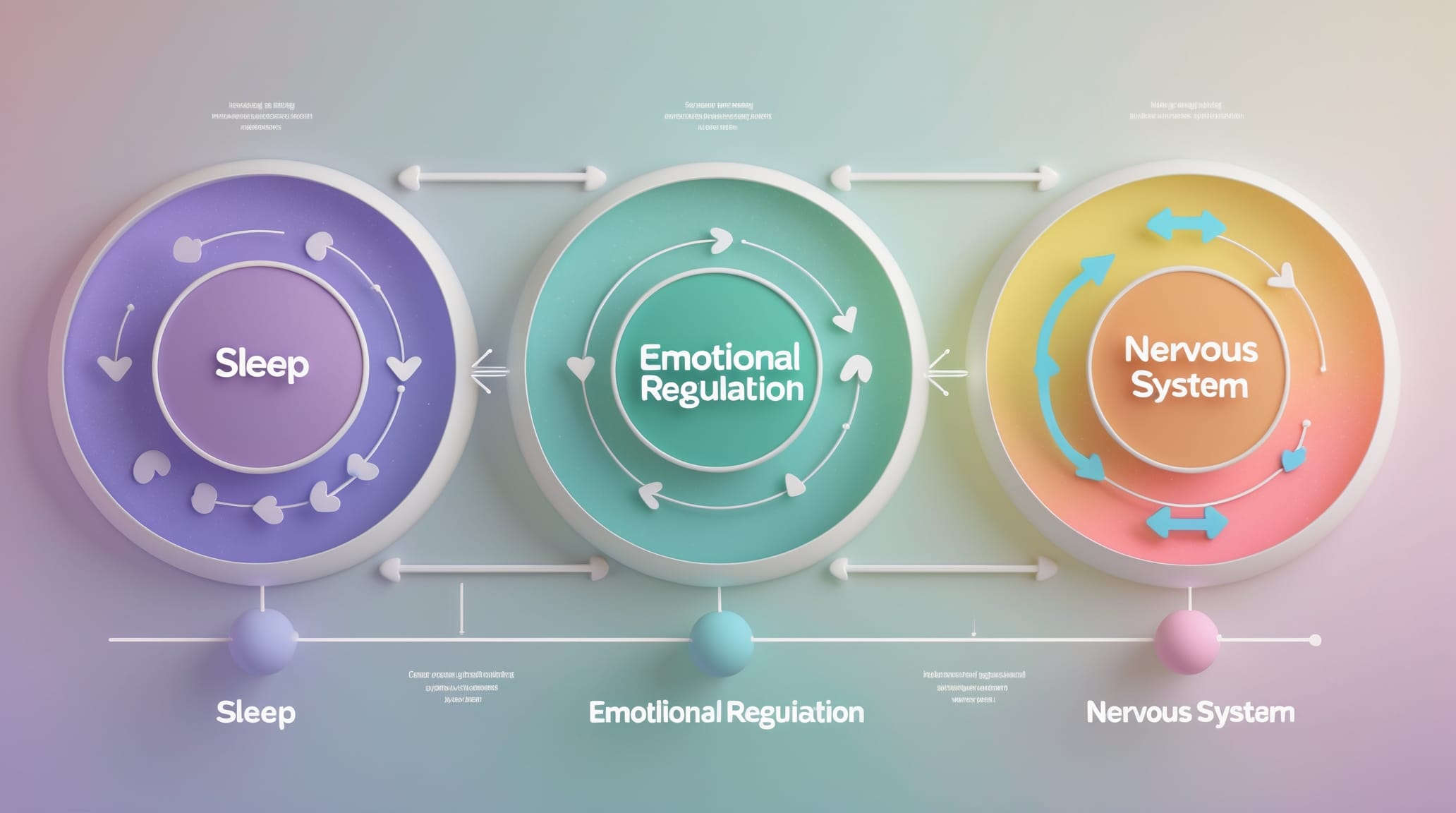The Perfect Storm: When Sleep Loss, Shame, and Anxiety Create a Cascade Crisis

The Perfect Storm: When Sleep Loss, Shame, and Anxiety Create a Cascade Crisis
Understanding the neurobiological cascade when midlife women's three most common struggles amplify each other
By Nura Noor, BSc Pharmacology (King's College London)
Specialized in Neurophysiology, Neuroimmunology, Neuropharmacology under Professors John F Tucker, Alan Gibson, Ian McFadzean
If you've ever found yourself lying awake at 2:47 AM, replaying an embarrassing moment from earlier while your heart races with worry about tomorrow's challenges, you've experienced what researchers now recognize as cascade crisis. You're not dealing with three separate problems that happen to occur together. You're experiencing one interconnected neurobiological system that's become dysregulated through measurable pathways.
When Rebecca's boss corrected her in front of the team, the shame still burned in her chest hours later. As she tried to fall asleep, her mind started spinning through every possible terrible outcome. Her heart began racing, her chest felt tight, and sleep became impossible. The next day, exhausted and emotionally raw, the smallest criticism sent her into tears while anxiety about another sleepless night made her body tense with anticipation.


The Neurobiological Trinity: Why These Three Always Travel Together
If you recognize this perfect storm pattern, you're among the 78% of women over 40 who experience this exact trinity of interconnected struggles, according to research from Harvard Medical School. The cascade crisis isn't coincidental—it's neurobiological.
The same brain circuits, hormones, and inflammatory pathways that regulate sleep also control emotional sensitivity and anxiety responses. When one system becomes dysregulated, it creates cascade effects throughout the others, like dominoes falling through your nervous system.
The Shared Neural Infrastructure
Research from Stanford University's Department of Psychiatry demonstrates that sleep, shame processing, and anxiety regulation all depend on overlapping brain networks that become vulnerable during midlife transitions.
The prefrontal cortex manages emotional regulation, executive control, and sleep initiation. When you're sleep-deprived, this "CEO brain" loses capacity to regulate both shame responses and anxiety spirals, leaving you emotionally reactive and mentally hyperactive.
The anterior cingulate cortex processes both social pain (shame) and threat detection (anxiety), while also influencing sleep quality through its connections to circadian rhythm centers. When this region becomes hyperactive from stress or inflammation, it amplifies both emotional pain and sleep disruption.
The amygdala amplifies both fear responses and shame reactions. Stress-related amygdala hyperactivity disrupts the sleep architecture needed for emotional recovery, creating a cycle where poor sleep makes you more emotionally reactive, and emotional reactivity makes sleep more elusive.
The inflammation connection: Chronic low-grade inflammation, which increases naturally during midlife, amplifies all three conditions simultaneously through shared molecular pathways. Inflammatory cytokines don't just affect one system—they create cascade effects throughout your brain-body network.

The Five Cascade Crisis Patterns
Pattern 1: The Sleep-Shame Amplification Loop
"When I don't sleep well, everything feels like a personal attack"
If you've noticed that poor sleep makes you more sensitive to criticism or social situations, you're experiencing a well-documented neurobiological sequence. Poor sleep reduces prefrontal cortex function—your brain's emotional regulation center—making you more vulnerable to shame triggers. These heightened shame responses then create stress hormones that further disrupt sleep, creating deeper emotional sensitivity the next day.

Pattern 2: The Anxiety-Insomnia Spiral
"My mind won't turn off because it's trying to solve everything at 3 AM"
When daytime anxiety elevates cortisol levels that persist into nighttime hours, it prevents the natural cortisol decline needed for sleep initiation. Sleep loss then reduces your brain's capacity to regulate anxious thoughts the next day, while increased anxiety about sleep creates anticipatory arousal that makes rest even more elusive.
Pattern 3: The Shame-Anxiety Feedback Loop
"I'm anxious about people judging me, then ashamed that I'm so anxious"
Shame experiences activate the same brain circuits as physical danger, creating generalized anxiety about future social situations. This social anxiety leads to avoidance or hypervigilance that creates more opportunities for shame, while developing what researchers call "meta-shame"—shame about being anxious, creating shame about shame itself.
Pattern 4: The Triple Amplification Crisis
"Everything feels impossible when I'm tired, anxious, and beating myself up"
During periods of high stress or hormonal changes, all three systems dysregulate simultaneously. Each condition amplifies the others through shared inflammatory and stress hormone pathways, making normal coping strategies feel inadequate because multiple systems need support simultaneously.
Pattern 5: The Hormonal Acceleration Effect
"This all got so much worse after 40—what changed?"
Declining estrogen reduces natural anxiety buffering and sleep support, while progesterone loss eliminates your body's natural relaxation chemicals. Cortisol dysregulation during hormonal transition amplifies stress responses, and increased inflammation from hormonal changes amplifies all three conditions simultaneously.

Breaking the Cascade Crisis: Integrated Intervention Strategies
Phase 1: Stabilize the Foundation (Weeks 1-2)
Because these systems are interconnected, addressing multiple areas simultaneously often creates faster results than single-focus approaches. The cascade crisis requires what researchers call "systems intervention"—targeting shared pathways rather than isolated symptoms.
Sleep foundation: Consistent sleep/wake times, cool dark room, no screens 2 hours before bed
Inflammation reduction: Anti-inflammatory foods, omega-3 supplementation, stress management
Nervous system regulation: Daily breathing practice, cold exposure, or gentle movement

Phase 2: Address Interconnected Patterns (Weeks 3-6)
Challenge thoughts that create shame about being anxious or anxiety about being judged. Develop bedtime routines that address emotional processing, not just sleep hygiene. Learn to recognize when one problem is triggering the others and intervene early in the cascade sequence.
Phase 3: Rebuild Resilience (Weeks 6-12)
Develop capacity to experience difficult emotions without cascading into shame, anxiety, or sleep disruption. Build systems that prevent future cascade crises during high-stress periods. Create lifestyle approaches that support all three areas long-term through shared biological pathways.

Breaking Free from Your Perfect Storm
Understanding that your sleep, shame, and anxiety struggles are connected through identifiable neurobiological mechanisms transforms them from overwhelming, mysterious problems into addressable patterns with clear intervention points. You're not dealing with three separate problems that happen to occur together—you're experiencing one interconnected system that's become dysregulated through measurable pathways that can be rebalanced.

The same interconnections that create cascading problems can create cascading solutions. Improving sleep quality enhances emotional regulation. Reducing shame sensitivity calms anxiety responses. Managing anxiety supports better sleep. Each improvement supports the others through shared neurobiological pathways.
Your Sacred Truth About the Perfect Storm
Your cascading struggles aren't evidence that something is fundamentally wrong with you. They're evidence of a sophisticated nervous system responding to real neurobiological changes during a complex life transition. The same sensitivity that creates your cascade crisis can become your greatest strength when supported with understanding and targeted intervention.
Many women discover that addressing these interconnected patterns leads to emotional wisdom, resilience, and authenticity they never had access to in earlier decades. Your perfect storm can become your perfect opportunity for integrated healing that addresses not just symptoms, but the underlying patterns that have been limiting your full expression and joy.
Related Articles
The 3 AM Emotional Storm: Why Nighttime Amplifies Shame and Worry
Discover the neurobiological reasons why emotional pain feels worst in the early morning hours.
Hot Flashes and Sleep: The Hidden Neurological Connection
Understanding the neurobiological mechanisms behind vasomotor symptoms and sleep disruption.
Perimenopause Insomnia: Why Sleep Hygiene Isn't Enough
Why traditional sleep advice fails during hormonal transitions and what actually works.